Are you struggling to restore the sparkle to your outdoor surfaces and can’t decide between power washing vs pressure washing? This guide unpacks the true differences, use cases, and which method will help your property shine—without costly mistakes!
Are Power Washing and Pressure Washing the Same? Unpacking the Power Washing vs Pressure Washing Debate
The terms power washing and pressure washing are often used interchangeably, but they are not the same. The main difference lies in the temperature of the water and the types of cleaning tasks each is designed to handle. Power washing uses heated water , making it a heavy-duty option for removing tough grime, grease stains, or chewing gum from hard surfaces such as concrete or industrial flooring. In contrast, pressure washing relies solely on high-pressure cold water to blast away dirt and grime from outdoor surfaces like wood decks, vinyl siding, or vehicles. Understanding these differences ensures you’re not just choosing a garden hose on steroids, but the right washing service for your needs.
Selecting the appropriate cleaning method can extend the life of surfaces and improve curb appeal, but choosing incorrectly risks damaging materials or wasting money. Throughout this guide, we'll explore practical examples, benefits, and limitations of power washing and pressure washing , ensuring you have the knowledge to make an informed decision—whether cleaning up a dusty deck or erasing stubborn oil stains from a driveway.
- The true differences between power washing vs pressure washing
- When to choose power wash or pressure wash for your needs
- Benefits, limitations, and best applications of each cleaning solution
- How to select the right washing service
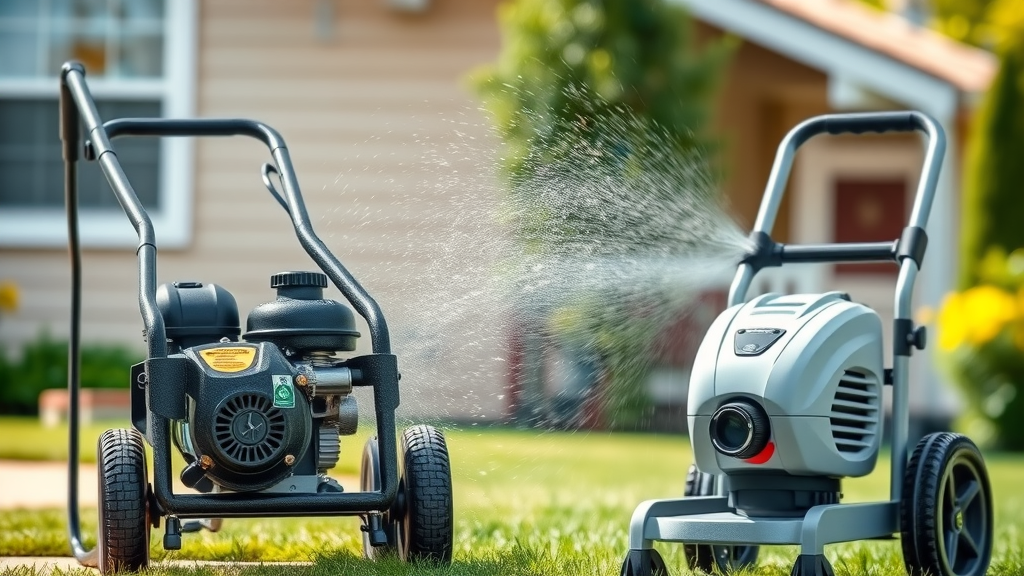
Understanding Power Washing vs Pressure Washing—Definitions and Core Concepts
To distinguish power washing from pressure washing , it's vital to know their specific characteristics. Power washing involves using a power washer that heats water before it’s sprayed. This hot water penetrates oily residues, breaking down contaminants more effectively. Pressure washers , however, utilize cold water , leveraging high water pressure to dislodge and rinse away dirt or organic matter from surfaces that aren’t coated in oils or sticky residues.
While both washing services dramatically improve the look and hygiene of outdoor surfaces , their applications differ. Power washing is best for heavy-duty cleanups—think grease on commercial driveways—while pressure washing is a go-to for routine maintenance such as clearing dirt off siding or decks. Being clear on the distinction saves time and money, preventing accidental surface damage and ensuring a pristine result every time.
| Feature | Power Washing | Pressure Washing |
|---|---|---|
| Water Temperature | Heated | Unheated |
| Typical Use Cases | Heavy-duty, mold, grease | General cleaning, dirt |
| Equipment Required | Power washer | Pressure washer |
| Surfaces Best Suited For | Concrete, patios, industrial | Siding, wood decks, vehicles |
How Pressure Washing Works: Methods, Equipment, and Applications
Pressure washing uses high-pressure streams of cold water to blast away dirt , dust, and organic buildup from various outdoor surfaces. The pressure washer connects to a water supply and motor pump, producing a forceful jet capable of deep-cleaning driveways, decks, and vehicles. Whether attached to a garden hose or self-contained, these machines deliver focused, pressurized water that’s much more effective than traditional scrubbing.
The versatility of pressure washing makes it a popular choice for homeowners and professionals alike. From removing mud, mold, and mildew to prepping surfaces for painting, it works quickly and efficiently—saving valuable time compared to manual methods. However, not all surfaces tolerate high pressure well. Wood, painted finishes, or older masonry may require a careful approach and lower pressures to avoid damage, highlighting the importance of knowing when and how to use this tool responsibly.
The Mechanics of a Pressure Wash: Pressure Washer Insights
The pressure washer is engineered for optimal cleaning power. It draws water into a pump that accelerates the flow, resulting in a stream of pressurized water that can be directed through a wand or rotating nozzle. This force is adjustable, with most residential models allowing users to choose higher or lower settings depending on the cleaning task at hand. For tough stains and stubborn dirt, higher pressure may be needed; for fragile materials, a gentler setting ensures no surface damage.
Choosing the right pressure washer model—from electric-powered compact units to gas-powered heavy-duty machines—depends on your cleaning goals and surfaces. Accessories, such as surface cleaners, extension wands, and angled tips, further boost versatility. Importantly, while pressure washers excel at removing surface grime, they don’t sanitize as thoroughly as power washers, which leverage heated water for sterilization and advanced cleaning.
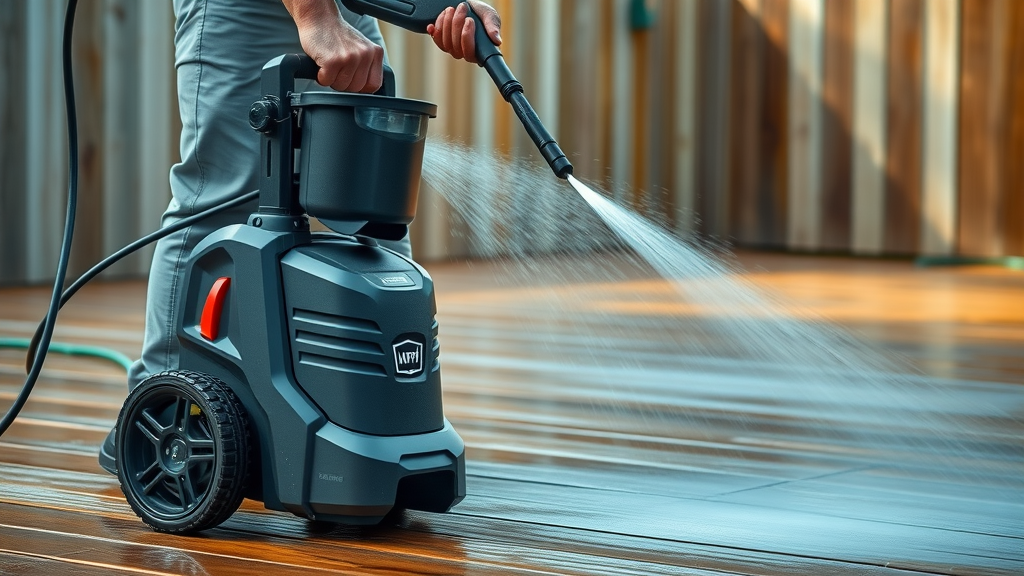
Pressure Washing: Ideal Surfaces and Common Use Cases for Pressure Washers
Pressure washers are best suited for cleaning robust outdoor surfaces like concrete pathways , patios, fences, siding, and even some vehicles. Routine maintenance with a pressure washer can quickly eliminate dust, pollen, and mildew—keeping your property fresh and well maintained. But despite their power, some surfaces such as old brick, weathered wood, or fragile outdoor décor may require extra care to prevent chips, etching, or accidental removal of protective coatings.
The adaptability of pressure washing allows for a broad range of cleaning projects—perfect for homeowners prepping outdoor spaces for gatherings, cleaning up after storms, or just keeping curb appeal high. Remember, though, while pressure washers are highly effective for routine cleaning, surfaces with serious grease, oil, or stuck-on contaminants are often better tackled with the heat advantage of power washing .
"A pressure washer is a versatile tool for routine outdoor cleaning, removing dust, mold, and mildew from a variety of surfaces."
How Power Washing Works: Unique Benefits and Limitations of Power Wash Services
Power washing distinguishes itself with one core element: the use of hot water , courtesy of a built-in heating element in the power washer . This capability allows it to dissolve grease stains, oil spills, and stubborn residues far more effectively than cold water alone. The combination of high water pressure and elevated water temperature is especially valuable for commercial settings or surfaces exposed to automotive fluids, food waste, or bacteria.
However, power washing isn’t always the best fit for every cleaning project. The heat and intense pressure can damage vinyl siding, aged decking, or delicate painted surfaces. Additionally, the increased energy required to heat water means power washing typically demands more electricity or fuel, translating into higher operating costs and environmental impact. Choosing this method is ideal for tough-to-remove build-up but not always for routine household maintenance.
Power Wash or Pressure Wash? When Heat Makes the Difference
The critical factor for deciding between power wash and pressure wash is whether heated water is necessary. If your challenge involves removing oil, grease, sticky residues, or deeply embedded contaminants, the heat from a power washer can break them down much faster—saving time and ensuring a cleaner surface. For large food-preparation areas, garage floors, or heavily soiled driveways, power washing is the duty option of choice.
In contrast, for everyday dirt and typical debris, a pressure washer will suffice, offering energy savings and lower cost. The heat advantage is significant under cold weather conditions as well, helping to thaw frozen grime for easier removal. Evaluating your project’s surface material and contamination type will reveal when the heating element of a power washer is genuinely warranted.
Best Surfaces and Conditions for Power Washing and Pressure Washing
Power washing excels on tough, non-porous surfaces such as unpainted concrete, stone driveways, brick patios, or large commercial spaces with built-up grease. It is particularly effective for sanitizing spaces and removing substances that won’t budge with cold water alone. Pressure washing remains the preferred solution for wood decks, vinyl siding, garden furniture, and vehicles, where gentle yet thorough cleaning matters more than hot water’s degreasing effect.
Factors like surface age, type, and previous treatments should influence your decision. While a power washer’s heat ensures a more sanitary, clean surface in commercial contexts, pressure washers provide safe, routine care for the majority of household exteriors. The right approach safeguards your investment and protects materials from unnecessary wear.
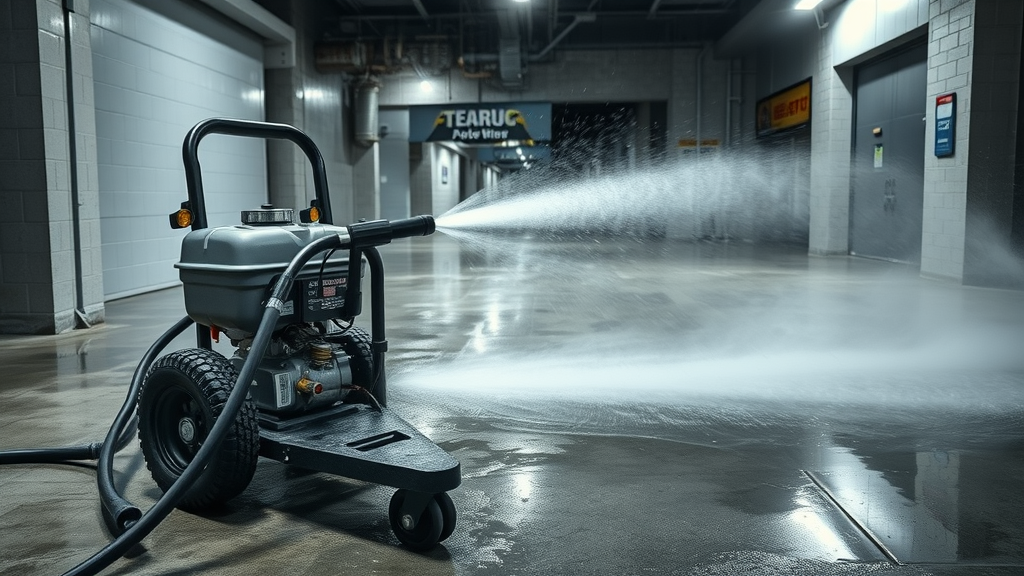
Power Washing vs Pressure Washing: Which Performs Better on Different Surfaces?
Understanding how power washing and pressure washing perform on common surfaces is essential for property owners. Each technique excels in different scenarios based on water temperature, pressure, and the type of grime being tackled. For best results, always match the cleaning method to your specific project, prioritizing the safety and longevity of each surface.
- Concrete and driveways: Power washing is the duty option for removing oil, chewing gum, and deep-seated stains on concrete. Pressure washing works well on new or lightly soiled surfaces, but may struggle with greasy build-up.
- Wood decks and fences: Pressure washing is generally safer for wood as it avoids unnecessary heat that could dry or warp planks. Always use lower pressure and test in an inconspicuous spot first.
- Vinyl siding and exterior walls: Pressure washing is preferred, delivering effective cleaning without risking damage from heat. However, for surfaces plagued by mold or mildew, a mild detergent may be added for extra power.
- Patio furniture: For plastic and metal furniture, pressure washing is appropriate. If there’s buildup from grease or sticky substances (from outdoor dining), a quick power wash may be warranted, but check fabric or paint durability first.
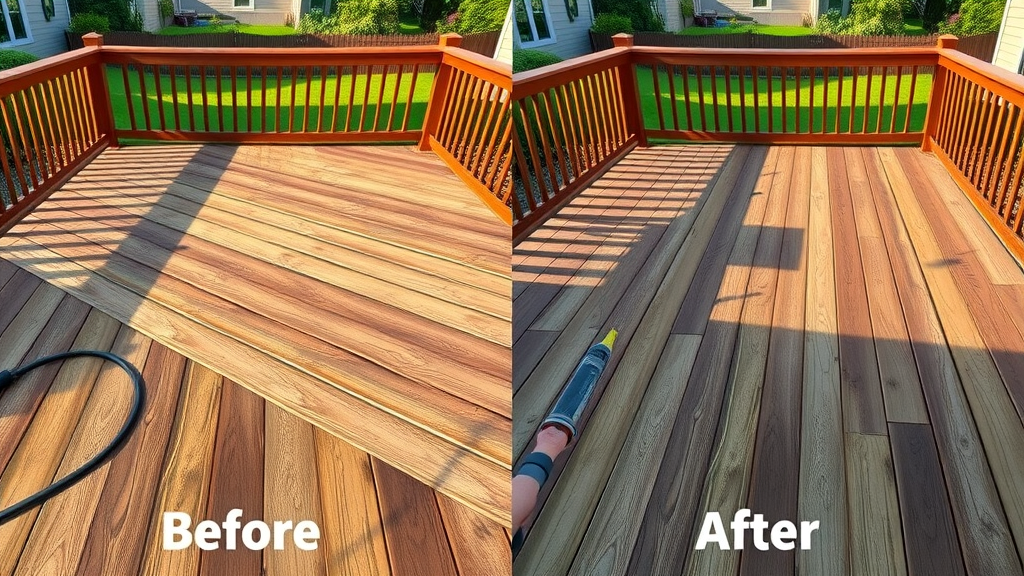
Cost Analysis: Power Washing vs Pressure Washing—Which Is More Cost-Effective?
Cost is a major consideration when deciding between power washing vs pressure washing . While both services offer excellent results, pricing varies with equipment complexity, energy consumption, and the nature of the job. Pressure washing services are usually more affordable due to lower energy use and faster cleaning on routine surfaces. For heavy-duty cleaning or sanitization from oil and grease, power washing commands a higher rate but can save on repair costs by maintaining surface longevity.
| Service Type | Average Cost (per sq.ft.) | Pros | Cons |
|---|---|---|---|
| Pressure Washing | $0.10–$0.50 | Affordable, efficient | May not remove all stains |
| Power Washing | $0.15–$0.75 | Deeper cleaning, eliminates tough grease | Higher energy use, more expensive |
Evaluating the size and specific conditions of your project helps avoid unnecessary overspending. If your goals are deep sanitation or removing stubborn grime, the higher upfront cost of power washing can be justified. For general maintenance, pressure washing is typically the best value.
Environmental Impact: Comparing Water, Energy Use, and Eco-Friendliness in Washing Services
Environmental concerns are increasingly important when selecting washing services. Power washing uses more energy because of the water heating element, potentially resulting in a larger carbon footprint. On the other hand, pressure washing is more energy-efficient, but both methods require significant water. Utilizing biodegradable detergents, employing water recycling, and selecting the lowest effective pressure help minimize environmental impact.
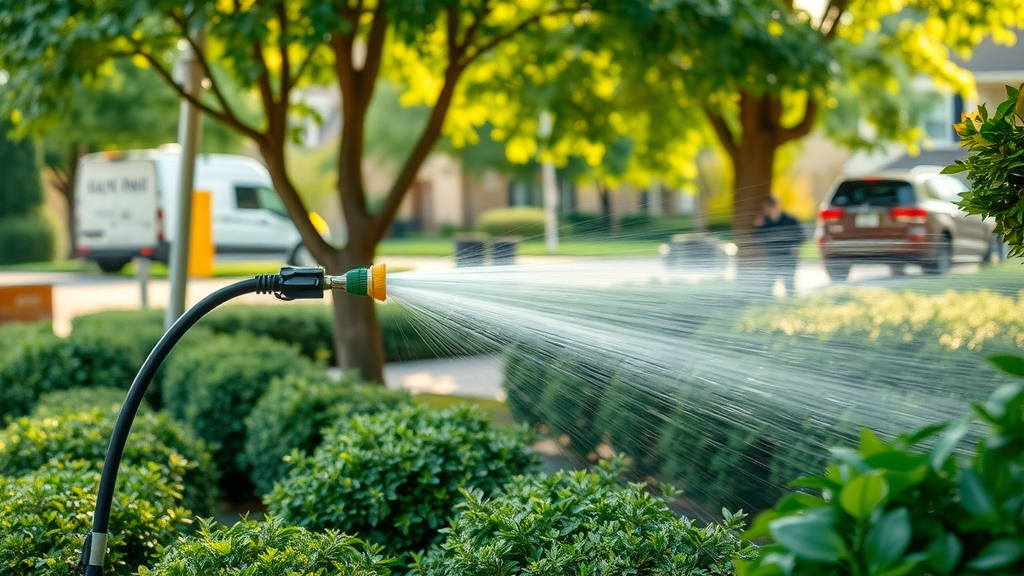
- Sustainable practices for power washing: Use hot water only when necessary, opt for energy-efficient machines, and choose green cleaning solutions to reduce runoff impacts.
- Sustainable practices for pressure washing: Incorporate water-saving nozzles, schedule cleanings during dry weather to avoid runoff into drains, and use non-toxic detergents.
Both services can be performed with sustainability in mind. Choose providers committed to eco-friendly processes, or if DIY, research techniques to conserve resources while keeping your property clean.
Safety Considerations and Potential Risks: Using a Pressure Washer or Power Washer Correctly
Both pressure washers and power washers are potent cleaning devices—if misused, they can pose risks to both the user and the surfaces being cleaned. High-pressure water jets have the potential to break skin, damage wood or paint, and create hazardous flying debris. For homeowners, improper pressure washing can lead to costly repairs or injuries, so understanding and adhering to safe operating practices is critical.
Common Dangers with Pressure Washers and Power Washers
The major hazards of washing and pressure washing include accidental lacerations from the pressurized water, electric shock (especially on wet ground), and surface damage from using the wrong settings. Additionally, hot water in power washers presents a scald risk. Flying debris, such as small stones, can harm people or pets nearby, while slip hazards are created by wet surfaces.
It’s also important to remember that even professional-grade pressure washing and power washing equipment requires careful handling, with personal protective equipment (PPE) necessary to minimize injury risk. Never point the wand at people or animals, and keep the equipment away from electrical sources.
Safety Tips for Homeowners and Professional Washing Services
Some basic safety precautions make a big difference:
- Read and follow manufacturer instructions before operating any pressure washer or power washer .
- Wear approved safety glasses, gloves, and non-slip footwear.
- Keep children, pets, and bystanders clear of work zones.
- Test pressure settings on inconspicuous areas to avoid damaging fragile surfaces.
- For electrical models, always use GFCI-protected outlets and check extension cords for damage before use.
"Pressure and power washers can clean efficiently, but improper use can cause surface damage or personal injury."
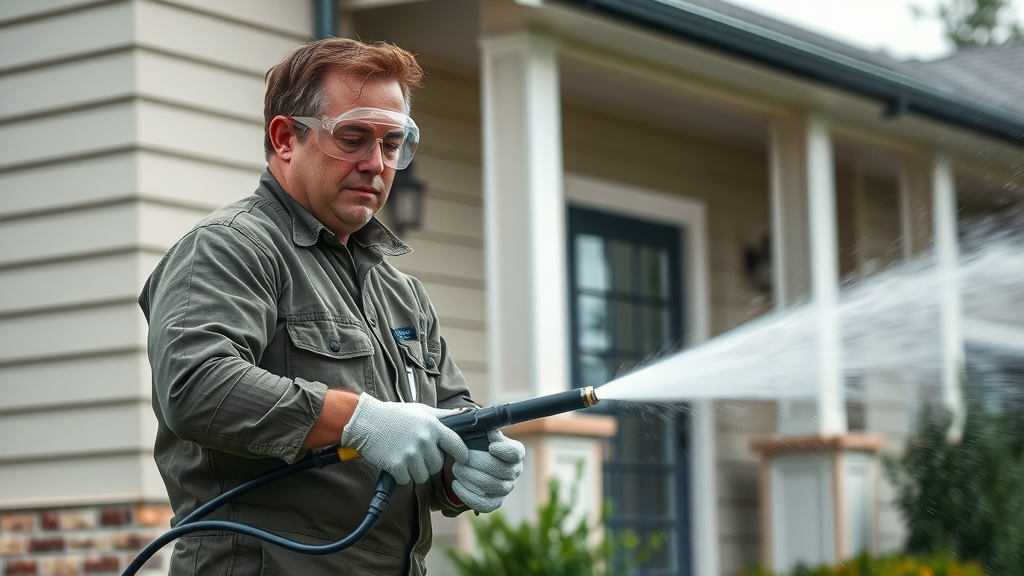
Selecting the Right Washing Service Provider: What to Look For
When choosing a washing service provider for power washing or pressure washing , thorough vetting is essential. Look for companies with proven experience, proper licensing, and safety certifications. Reading reviews and testimonials offers insight into their reliability, while insured providers offer peace of mind against accidental damages. Ask about their equipment—power washers, pressure washers, and cleaning solutions—to ensure they're equipped for your project type.
- Experience with power wash and pressure washing
- Insurance and safety certifications
- Reputation and reviews
Transparent pricing, open communication, and a willingness to answer questions about environmental and safety protocols are also important indicators of a reputable washing service . Don't hesitate to compare several providers to ensure you find the best fit.
DIY vs Professional: Should You Rent or Hire for Power Washing vs Pressure Washing?
Homeowners often wonder whether to rent equipment for a DIY cleaning or to hire a professional instead. The decision comes down to the scope of the project, comfort with the equipment, and the surfaces involved.
Benefits of DIY Pressure Washers vs Professional Washing Services
Renting a pressure washer is cost-effective for smaller, less complicated jobs like cleaning patios or driveways. DIYers have the flexibility to work at their own pace and the satisfaction of a hands-on approach. However, lack of experience can lead to surface damage, overlooked safety, or costly mistakes—especially with power washers , which include a heating element and higher energy use.
Professional washing services bring expertise, powerful equipment, and time-saving efficiency. They understand how to clean each surface type without causing harm, ensure adherence to local water use regulations, and often guarantee results. This is especially important for delicate or invaluable surfaces, or when large areas need fast, thorough cleaning.
When to Hire an Expert for Your Power Washing and Pressure Washing Needs
Consider calling a professional for power washing or pressure washing when facing tough stains, needing fast turnaround, or working with multi-story and commercial properties. It’s also wise for projects involving hazardous materials, older surfaces, or extensive repairs—professional teams have the right nozzle, detergent, and safety training for the job.
Hiring a washing service like Refreshing Pro Wash not only delivers spotless outcomes, but protects your investment in the long term—preventing accidental damage and ensuring surfaces are properly maintained.
Video Demonstration: Power Washing vs Pressure Washing Outcomes
Seeing is believing: real-time demonstrations provide a clear picture of the differences between pressure washing and power washing . Videos highlight how each method handles oil spills, mold, or dirty siding, illustrating practical results for homeowners and facility managers. For step-by-step guidance and to watch a professional at work, seek reputable service videos online to set expectations and see which technique matches your needs.
Video: Watch a Professional Pressure Wash and Power Wash Side-by-Side
In a typical video, viewers can see side-by-side cleaning of the same dirty driveway or deck using a pressure washer and a power washer . The difference becomes pronounced where grease or deeply embedded debris is involved—the hot water of the power wash visibly dissolves contaminants, while the pressure wash excels at removing lighter dirt and mildew efficiently. Such demonstrations help clarify which choice is best for your situation.
Comparing Real Customer Experiences—Power Washing and Pressure Washing Service Stories
Nothing beats the insight gained from real people sharing their experiences. Case studies reveal why homeowners opted for power washing for their grease-stained garage and pressure washing for regular deck upkeep. Their lessons can save you time, money, and hassle by highlighting challenges and solutions from a consumer perspective.
- One homeowner used power washing to triumph over stubborn oil stains on a busy driveway, sharing that only the heat could restore a clean surface.
- Another relied on pressure washing for delicate wooden fencing—delivering a fresh appearance without damage or splinters.
"After hiring a power washing service, our driveway looked brand new. It's worth the investment for stubborn stains!"
People Also Ask: Is power washing better than pressure washing?
Deciding Which Is Better: Situational Performance of Power Washing vs Pressure Washing
The answer depends on your surfaces and needs. Power washing delivers superior results for oily, greasy, or sanitized environments thanks to hot water . Pressure washing is better for routine maintenance of decks, siding, and furniture, being more cost-effective and gentler. Both are essential for distinct cleaning scenarios—assess your goals to decide which is better.
Always balance intensity and material compatibility. If surface protection is vital, favor pressure washing; if deep cleaning is needed, opt for power washing. In many cases, a professional can advise or combine methods for best results.
People Also Ask: Does pressure washing increase water bill?
Understanding Water Usage: Pressure Washers and Utility Costs
Using a pressure washer does use more water than a garden hose, but thanks to efficiency and speed it can often be less wasteful for large projects. For regular household usage, pressure washing will cause a moderate increase in your water bill; however, the difference is often offset by less time spent cleaning and more effective results.
For substantial water savings, seek pressure washers with water-saving features or hire washing services that use commercial-grade, efficient systems. Always follow best practices: sweep debris first, use targeted sprays, and avoid leaving the unit running unused.
People Also Ask: What are the disadvantages of a pressure washer?
Pressure Washer Drawbacks: Surface Damage, Noise, and Safety Risks
The main concerns with pressure washers are potential surface damage, high noise levels, and safety hazards. Using too much pressure on fragile surfaces—such as wood, aged brick, or certain paints—can result in gouges, chips, or loss of protective coatings. Additionally, the noise produced by high-powered models can be significant, requiring hearing protection.
Lastly, misuse of the pressurized spray can cause accidental injury. Always prioritize proper safety gear and training, or consult a professional service where expertise and experience ensure the safe and effective use of equipment.
People Also Ask: Is power washing a house worth it?
Evaluating Value: Power Washing for Home Maintenance
Power washing a house can provide a fresh, like-new appearance, especially for surfaces marred by heavy grime, grease, or mildew. The heated water eliminates more germs and deeply embedded dirt, prolonging the lifespan of surfaces and potentially increasing property value. For homes near highways, restaurants, or heavy-duty infrastructure, power washing can be especially worth the investment for dramatic results.
However, for regular cleaning, the extra cost and energy use may not be justified—pressure washing is usually sufficient. Ultimately, assess the type and level of contamination before deciding.
FAQs on Power Washing vs Pressure Washing
- How often should I power wash vs pressure wash? It depends on local climate and surface exposure. Typically, pressure washing is recommended once a year for general upkeep, while power washing is reserved for specific, tougher jobs as needed.
- Can I use the same equipment for both methods? Not exactly—a power washer includes a heating element for hot water, while a standard pressure washer does not. Some commercial machines can switch between modes, but always follow manufacturer guidance.
- What cleaning solutions are recommended for power washing and pressure washing? Use detergents formulated for your target material (e.g., wood, vinyl, concrete) and, if possible, select biodegradable options to minimize environmental risk.
Making Your Choice: Factors to Consider Before Booking Power Washing or Pressure Washing
- Project type and surface material: Match washing method to the material and contamination type.
- Environmental concerns: Choose eco-friendly products and providers, and consider water runoff effects.
- Budget and timeline: Determine costs for DIY versus hiring pros, including time saved and potential repair risks.
"Both power washing and pressure washing have essential roles in exterior cleaning. Selecting the right method ensures best results while protecting your property."
Contact Us for Expert Power Washing and Pressure Washing Services
Ready for spotless results? Call Refreshing Pro Wash at (541) 636-8094 to Learn More. Our team will help you choose between power washing vs pressure washing for your home or business, guaranteeing safe, efficient, and lasting outcomes!
When deciding between power washing and pressure washing, it’s essential to understand their differences to choose the most effective method for your cleaning needs. Power washing utilizes heated water, making it particularly effective for removing tough stains like grease and oil from surfaces such as driveways and garage floors. In contrast, pressure washing relies on high-pressure cold water, suitable for general cleaning tasks on surfaces like decks, patios, and siding. ( upcpaint.com )
However, improper use of these methods can lead to damage. Common mistakes include applying too much pressure, which can harm surfaces like wood and concrete, and using hot water in equipment designed for cold water, potentially damaging the washer itself. To avoid these issues, it’s crucial to select the correct nozzle, maintain appropriate pressure settings, and follow safety guidelines. ( tomsguide.com )
For delicate surfaces or areas with heavy grease buildup, consulting a professional can ensure effective and safe cleaning. Professionals have the expertise to choose the appropriate method and settings, preventing potential damage and achieving optimal results. ( homegnome.com )
By understanding the distinctions between power washing and pressure washing and adhering to best practices, you can maintain your property’s appearance and longevity without unnecessary risks.
 Add Row
Add Row  Add
Add 

Write A Comment